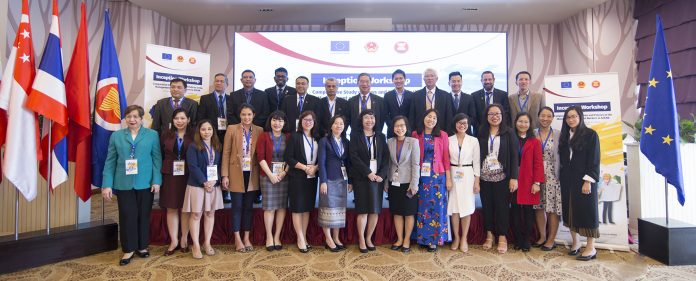 |  |  |
DA LAT, 8 November 2019 – A 2-day inception workshop to plan for the comparative study on laws and policies on the management of migrant workers in the ASEAN region was concluded today in Da Lat, Viet Nam.
Focal points of the Senior Labour Officials Meeting’s Working Group on Progressive Labour Practices to Enhance the Competitiveness of ASEAN (SLOM-WG) and Chairs of the eight ASEAN Committees in charge of the ASEAN Mutual Recognition Arrangements participated in the workshop. Participants discussed their respective country’s regulatory and policy challenges, ASEAN frameworks related to labour mobility, as well as opportunities to better manage labour mobility within ASEAN.
The comparative study is a project planned in the SLOM-WG Work Plan 2016-2020 under the coordination of the Ministry of Labour, Invalids and Social Affairs of Viet Nam with the support of the Enhanced Regional EU-ASEAN Dialogue Instrument (E-READI) and the ASEAN Secretariat.
The study will explore the barriers to mobility of migrant workers within the ASEAN region and develop strategies to gradually overcome these hurdles. All skill levels and occupations including those under the eight ASEAN Mutual Recognition Arrangements will be covered by the comparative study, which will also include recommended actions for improvement. During the workshop, ASEAN Member States’ policymakers provided feedback on the objectives, methodology, outline and direction of the study.
The comparative study will also look into the experiences and practices of the European Union (EU) in managing labour migration. The EU’s labour mobility governance has positively impacted the social and economic growth of both sending and receiving countries, and contributes to regional development.
Mobility of migrant workers in ASEAN is high. According to the projection of International Labour Organisation, there were nearly 7 million ASEAN migrant workers in the region between 1990 – 2015 and this number has now grown significantly. Migrant workers contribute to the economies of ASEAN Member States individually and the ASEAN Community as a whole.
The outcomes of this comparative study are therefore expected to provide useful guidance to ASEAN in governing the mobility of migrant workers in accordance with the ASEAN Consensus on the Protection and Promotion of the Rights of Migrant Workers that was signed by the ASEAN Heads of State in 2017.
______________


